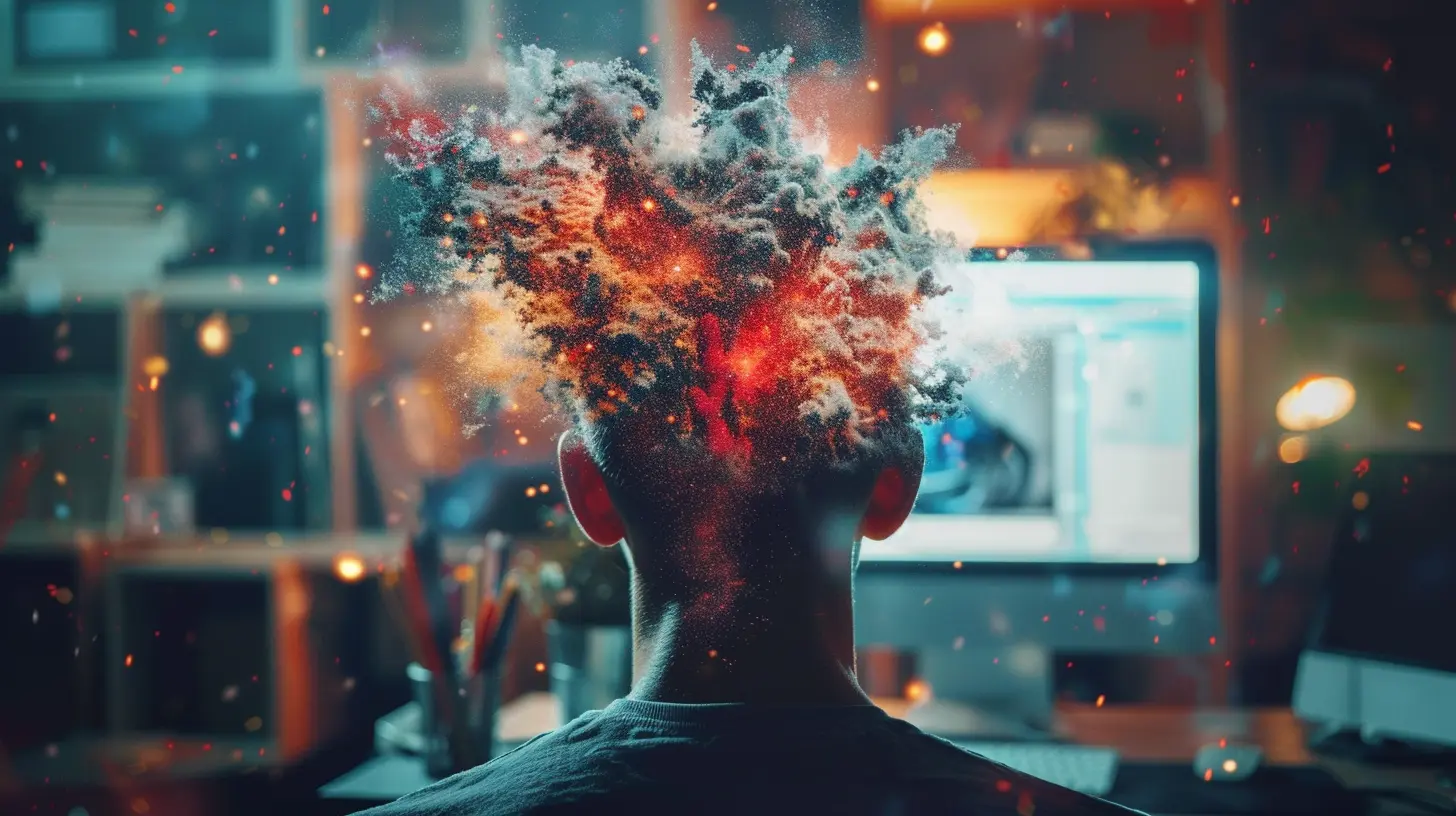Reducing Digital Overload for a Healthier Mind
1 July 2025
Let’s be real—our phones are practically glued to our hands. Notifications buzz like mosquitos every few seconds, tabs are open like windows in a storm, and our brains? They're fried. In a world that never truly logs off, many of us are running on digital fumes.
It’s no surprise: digital overload is silently chipping away at our mental wellness. But don’t worry—there’s hope. 🌿
You can reclaim peace, nourish your mind, and still be digitally connected. In this article, we're diving deep into how to reduce digital overload and reboot your brain for better mental health. Think of this as your permission slip to unplug... without going off the grid.
What Exactly Is Digital Overload?
Digital overload, or digital fatigue, is that exhausted, overstimulated feeling you get after consuming too much digital content. It’s the mental traffic jam caused by too many devices, apps, notifications, and endless scrolling.Think about it: how often do you…
- Check your phone the moment you wake up?
- Mindlessly scroll through Instagram or TikTok for hours?
- Feel anxious about unread emails or messages?
If that’s hitting too close to home, you're not alone. Our brains aren't wired to process this much information all at once. All this constant stimulation? It drains our focus, messes with our emotions, and steals our ability to just be.
Why It’s So Bad for Your Mental Health
Let’s break it down. When you're bombarded with digital input 24/7, your brain doesn’t get a break. Here's what that does to you:1. Increases Stress and Anxiety
Notifications are like little alarm bells going off in your brain. Every ping tells your brain something “urgent” is happening, even if it's just a meme. Over time, this keeps your stress hormones on overdrive.2. Disrupts Sleep
Ever scrolled through reels until 2 AM? Blue light from screens suppresses melatonin, the hormone that helps you sleep. Not to mention, an overstimulated brain has a hard time winding down.3. Shortens Your Attention Span
Switching between apps, tabs, and devices constantly? Your brain struggles to focus on one thing. This is literally training your mind to become more scattered.4. Causes Emotional Burnout
The constant influx of news, opinions, and content can lead to emotional exhaustion. Scrolling through everyone’s “highlight reel” on social media can also make you feel inadequate or left out.
Signs You're Suffering from Digital Overload
Okay, so how do you know if you're in too deep? Here are some red flags:- You feel anxious when you're not near your phone.
- You constantly check notifications—even when there are none.
- You have trouble focusing without background noise from a screen.
- You feel emotionally drained after screen time.
- You can’t remember the last time you were “bored” without instinctively grabbing your phone.
If you're nodding your head right now, keep reading. There are ways out of the digital chaos.
Simple Habits to Reduce Digital Overload
The goal isn’t to ditch technology altogether (because let’s be honest, that's not realistic). It’s about creating a healthier digital relationship. Here’s how to start.1. Set Boundaries with Technology
Boundaries aren't just for toxic people—they apply to tech too. Create digital "quiet zones" in your life. Examples?- No phones during meals
- No screens 1 hour before bed
- No social media in bed (yes, really)
Try setting time limits for apps using tools like Screen Time (iOS) or Digital Wellbeing (Android). You'll be shocked at how much time you're actually spending online.
2. Do a Digital Detox
This doesn't have to mean escaping to a cabin in the woods (though that sounds dreamy). A digital detox can be a few hours without screens, or a whole weekend offline.Try this: pick one day a week where you unplug. Use that time to journal, read a physical book, take a walk, or spend real face-to-face time with people.
3. Declutter Your Digital Space
Just like a messy room can cause stress, a cluttered phone or computer can overwhelm your mind.- Delete unused apps
- Turn off push notifications that aren't essential
- Organize your home screen so only the useful stuff is front and center
Digital minimalism = mental clarity.
4. Embrace Mindful Tech Use
Ever eat a whole bag of chips without realizing it? That’s mindless snacking. Many of us do the digital version daily. Mindful tech use means being intentional about when and why you use your devices.Ask yourself:
- “Why am I opening this app?”
- “Is this helping or hurting my mood?”
- “Could I be doing something more beneficial right now?”
Start noticing your patterns. Awareness is the first step to breaking them.
5. Take Breaks Often
The 20-20-20 rule is gold: every 20 minutes, look at something 20 feet away for 20 seconds. It gives your eyes a break and resets your brain.Also, don't forget to just stand up, stretch, walk around, or breathe deeply. Tiny breaks help reset your nervous system so you don’t spiral into burnout.
Reconnect With the Real World (It's Pretty Great)
Reducing digital overload isn’t just about cutting screen time. It’s about rediscovering what makes life truly fulfilling. That stuff that can't be downloaded.1. Cultivate Offline Joy
Remember hobbies? Like painting, gardening, dancing in your kitchen, or playing an actual board game? They’re still a thing—and they feed your soul in ways screens can’t.Doing something with your hands, moving your body, or engaging your senses brings real joy and satisfaction—not temporary dopamine hits.
2. Nurture In-Person Connections
Ever noticed how a text can't match the warmth of a real conversation? Face-to-face interactions release oxytocin (aka the “love hormone”) which makes us feel connected and safe.Even a short coffee chat can uplift your mood way more than scrolling ever will.
3. Spend Time in Nature
Nature is the ultimate therapist. A walk in the park, touching grass, feeling the sun—this stuff grounds you. Your brain calms naturally when you step into green spaces. It’s like rebooting your internal Wi-Fi.Mindfulness Practices to Clear Mental Clutter
You don’t have to become a monk, but a little mindfulness goes a long way in decluttering your mind from digital junk.1. Meditation (Yes, Even 5 Minutes Helps)
Apps like Headspace or Calm offer short guided meditations. But honestly, you don’t need an app. Just sit quietly, focus on your breath, and let your thoughts settle like snow in a globe.2. Journaling
Dumping your thoughts onto paper is like emptying your brain’s trash folder. It clears out emotional and mental clutter and helps you reconnect with yourself.3. Breathing Exercises
Feeling overwhelmed? Try this quick breath trick: inhale for 4 seconds, hold for 4, exhale for 4, hold for 4 (box breathing). It's calming and incredibly effective.Digital Tools That Actually Help (Ironically)
Not all tech is evil. The right tools can help you reduce digital overload, not add to it.- Forest App: Grow a virtual tree by staying off your phone
- Freedom: Blocks distracting apps and websites
- Todoist: Helps you plan your day so you're not winging it
- Grayscale Mode: Makes your phone less addictive and visually enticing
Use tech to manage tech. Smart, right?
Final Thoughts: You’re Not Meant to Be Plugged In 24/7
Listen, we’re not machines. We’re complex, soulful, living beings. Our brains need silence. Our eyes need rest. Our hearts need presence.Reducing digital overload is about coming back to yourself. It's about reclaiming attention, energy, and time so that you can live more fully—not just more virtually.
So, set those boundaries. Take those breaks. Be intentional. Your mind will thank you.
And remember: You’re not missing out on anything when you put the phone down. In fact, you might just start seeing everything you’ve been missing all along.
all images in this post were generated using AI tools
Category:
Healthy LifestyleAuthor:

Laura Hudson
Discussion
rate this article
2 comments
Faye Campbell
This article offers valuable insights into managing digital overload. By setting boundaries and prioritizing mental well-being, we can cultivate healthier habits. Embracing mindfulness and taking breaks from screens can significantly enhance mental clarity and overall health. Great read!
January 23, 2026 at 4:55 AM
Issac Monroe
Embrace balance and unplug for a brighter, healthier mind! You've got this!
July 12, 2025 at 3:51 AM

Laura Hudson
Thank you! Embracing balance is key for mental well-being. Let's prioritize our health!


